On International Women's Day (IWD), it's time we recognize something important - fashion empowers women.
It might seem like a strange declaration. We've often been taught, after all, that appearances are shallow, that vanity is bad, that it's wrong for a woman to flaunt her assets, whether a small waist, long legs, or an ample bosom. But that mindset is changing, and thank goodness for that. For why shouldn't any woman dress up, feel good, look great, and - to use the youthful vernacular - absolutely slay?
However, the fashion industry's ability to lend a woman influence and power is not restricted to the modern-day. The fashion industry is one of the few global industries which has always been driven by women, not only as end consumers, but craftspeople, designers, and business owners. In a patriarchal world, where women have struggled to own property, run her own business, or even have agency over her own body, the fashion industry is one place in which a woman can aim to thrive.
Back in the day, there were very few businesses women allowed to own and run, and a fashion house was one of them. Celebrating women throughout history, many of the earliest true fashion houses were run by women - Jeanne Lanvin (1867-1946), Jeanne Paquin (1869-1936), and of course, the ever-enduring Coco Chanel (1883-1971). These pioneering designers paved the way for Rei Kawakubo, Vivienne Westwood, Diane Von Furstenberg, and more.
Even before the concept of the 'fashion house', however, women were the movers and shakers in the world of beautiful clothing - although we often did not benefit from the profits as much as we should have. Men dismissed needlework and garment-making as 'women's work', usually poorly-paid, and often even detrimental to health. Today, however, we reclaim our experience, and discover women-led storytelling in the world of fashion. After all, the stories we consume shape our understanding of the world, and for too long, women's stories have been going untold.
Women did the spinning, carding and combing to create fabrics like wool, worsted and damask; they worked long hours in dark factories, breathing air heavily polluted with fluff, that caused severe lung and throat disease. Working-class seamstresses, embroiderers, and lacemakers sewed and crafted for long hours in bad light to rush out apparel they themselves would never wear. The toil of women clothed the world; but it was all dismissed as ‘only women’s work’.
Yet, right under the noses of the men who often ruled us, women managed to build a long-lasting, worldwide economy.
Style-makers across centuries have primarily been influential women - most of them Queens, like Marie Antoinette of France (who wore a miniature ship in her towering wig), Queen Victoria (who popularized both virginal white wedding dresses and grim all-black ensembles), and in more recent times, Kate Middleton the Princess of Wales (who single-handedly brought back the long-sleeved wedding gown). When a Queen made something fashionable, it could make the fortune of thousands of families, entire communities.
Today it's not only Queens who can afford beautiful fashion. Many of us are now fortunate enough to have the disposable income to maintain a full wardrobe of clothes. Now the time of Queens is long past - so who is it, who keeps textile workers and skilled garment makers going?
Of course - it’s YOU.
It's your support of women-owned businesses and organizations that make a difference. When you support a female designer, you are paying tribute to the thousands who came before - the unseen seamstresses and textile workers who have always been there, propping up a global industry. You're giving a voice to female-led businesses, to a feminine and female-centric point of view, in what we wear and how we choose to present ourselves. Learn about allyship in your daily life because women supporting women is important - it is worth celebrating.
Right here in Singapore, female designers are pushing boundaries and making waves. One of the most innovative labels to come up in recent years is OliveAnkara. This unique aesthetic combines Asian styling with African fabrics, colors, and silhouettes.

OliveAnkara came about when founder Ifeoma was looking for African fabrics for her wedding dress, and could not find any in Singapore. Born and raised in Italy to parents who immigrated from Nigeria, Ify was no stranger to European styling and innovation. She decided to buy some fabrics from Nigeria through a friend and put together her collection. Voila - OliveAnkara was born! Vibrant, unique, boasting confident and daring silhouettes, Ify has made her vision come to life: to bring African fabrics to Singapore and to make African-inspired clothes that can be worn by women of all races.
On a similar theme is up-and-coming conscious fashion brand Sui. Meaning ‘needle’ in Hindi, Sui’s aim is to spread awareness of conscious fashion that is versatile, has a minimal impact, is relatable and treats its makers as family. Founder Mahima, whose family has been in the garment industry for over 50 years, believes conscious fashion can be engaging, beautiful, and impactful.
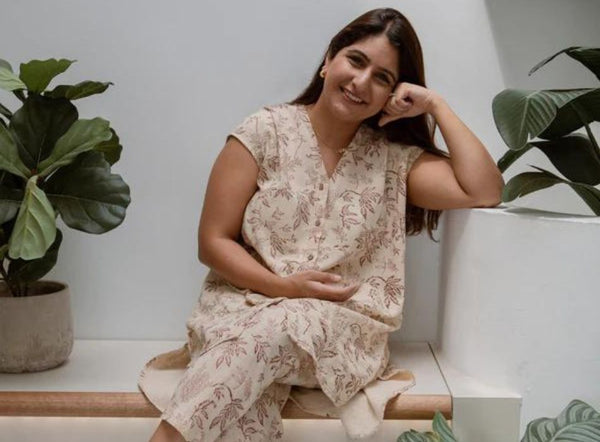
This commitment starts from ethically sourced and sustainable fabrics. Sui’s home fabric is handspun & handwoven, and no electricity is used in its creation. It is created in collaboration with Women Weave, Sui’s partner NGO focusing on women’s empowerment via the handloom textiles industry. Other textiles used in Sui’s line of classic, comfortable clothing include organic cotton, hemp, and recycled fabric collected by a specialist vendor in Gujarat.
Khara Kapas founder Shilpi Yadav (Khara Kapas means 'Pure Cotton' in Hindi) believes that well-designed clothes made from pure fabrics can bring happiness into people's everyday lives. All Khara Kapas products are handcrafted and made from pure, homegrown Indian fabrics.
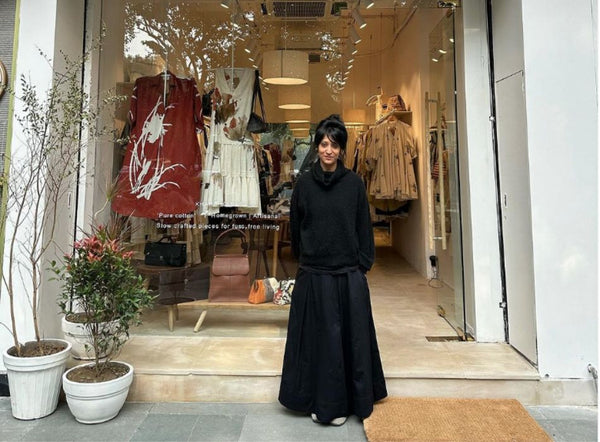
There is O’Frida, a brand which prides itself on comfortable, breathable fabrics inspired by a universal theme of the abstract expressionist movement.
In an article for Platform Magazine, O'Frida founder Rini Agarwal talks about how she was first inspired by passing through the villages of Kutch, where she encountered the weaving of kala cotton. ‘I had always been drawn to the exuberant spirit of Kutch since my childhood. At that point, never in my wildest dreams did I think I would eventually work in collaboration with weavers from Bhujodi, creating our own textiles for O’Frida.’
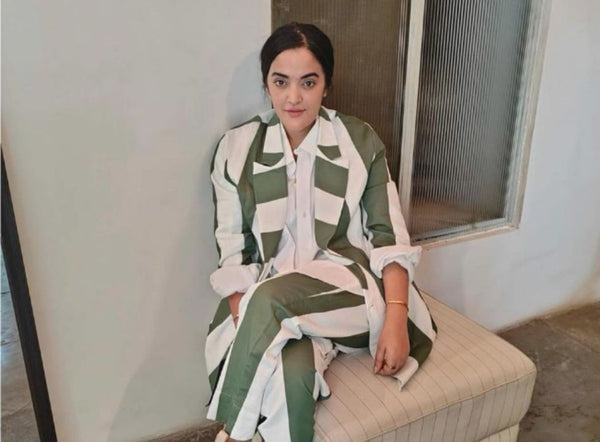
Another believer in beautiful and unique prints is Yam India. Founded in 2020, Yam is a print-centric, millennial-run brand that produces locally and doesn't adhere to the retail calendar. Yam proudly makes its own prints, creating new and contemporary artworks from traditional techniques of weaving, embroideries, sketching, and painting. Textiles are sourced from across India, including silks from Benaras and cotton and canvas from weavers in South India. Garments and accessories are made consciously and with zero wastage.
Maisha Concept, another proudly artisanal brand, features patterns and fabrics made under the care of a family of artisans in the village of Kaladera, Jaipur. Immediate family members and relatives work together to keep the workshop going. From preparing the raw cotton to hand-carving wood blocks; mixing paint and block-printing – everyone is part of the process. Founder Rakhee Shah named the brand Maisha, which means 'Giving Life' in Swahili, with strong ties to her childhood in Kenya and her ethnic roots in India.
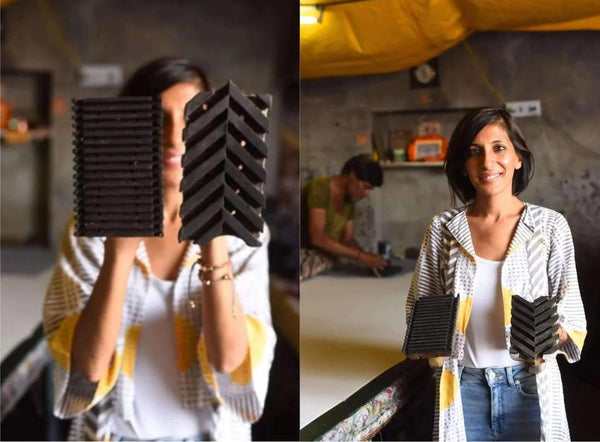 Pic Credit - Rakhee Shah
Pic Credit - Rakhee Shah
The Summer House brings you tradition with a modern edge. Luxuriating in the loving art of traditional textile making, The Summer House features khadi, jamdani, ajrakh printing, hand painting, and block printing. Every piece has a story, and every garment benefits its craftspeople. The Summer House’s Mashru fabric, for instance, is traditionally handwoven and not a mass-produced synthetic variety. ‘Real’ mashru weaves cotton and silk yarn in such a way that the cotton surface is worn against the skin, and the silken side faces outward. The artisan family working with The Summer House has been weaving Mashru for six generations. They use cotton yarn from locally grown indigenous cotton along with high-grade silk yarn. On average, it takes eight to ten months to develop a Mashru design. But the wait, say founders Rekha Dalta & Shivangini Padhiyar, is worth it.
At the end of the day, that is what this all means. It’s worth it, to support women-led businesses; worth it, to pay for a truly unique and quality garment that you will value for years to come. It is worth it to become part of the evolving landscape of women-led brands, and the emphasis these brands have on sustainable and ethical sourcing and practices. It is worth it to pay a little more and wait a little longer for your purchase to empower other women, at all levels of this industry, and ensure you’ve made a positive impact on their community and economy. You can shop, and you can slay; you are worth it too!
And it won’t end here. Today women are more visible than ever. We have a louder voice, a bigger place in the world. There are more women than ever in leadership roles, whether in business or in politics, in world affairs, or in our place in the home. There is no doubt we will continue to grow, evolve, innovate, and pave the way for future generations. International Women's Day provides an opportunity to acknowledge and celebrate the social, economic, cultural, and political achievements of women around the world. So today, and always, invest in women: accelerate progress.
Happy International Women’s Day!



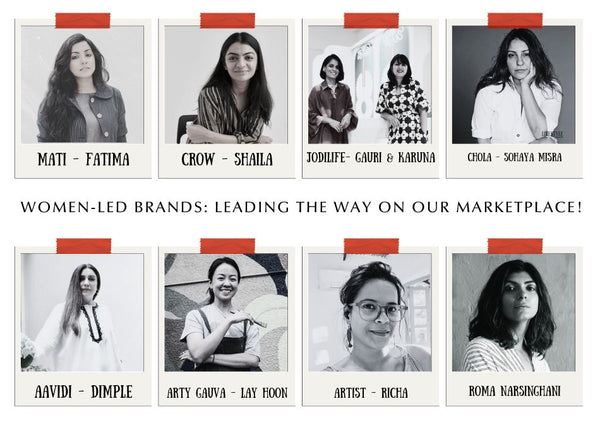
Leave a comment